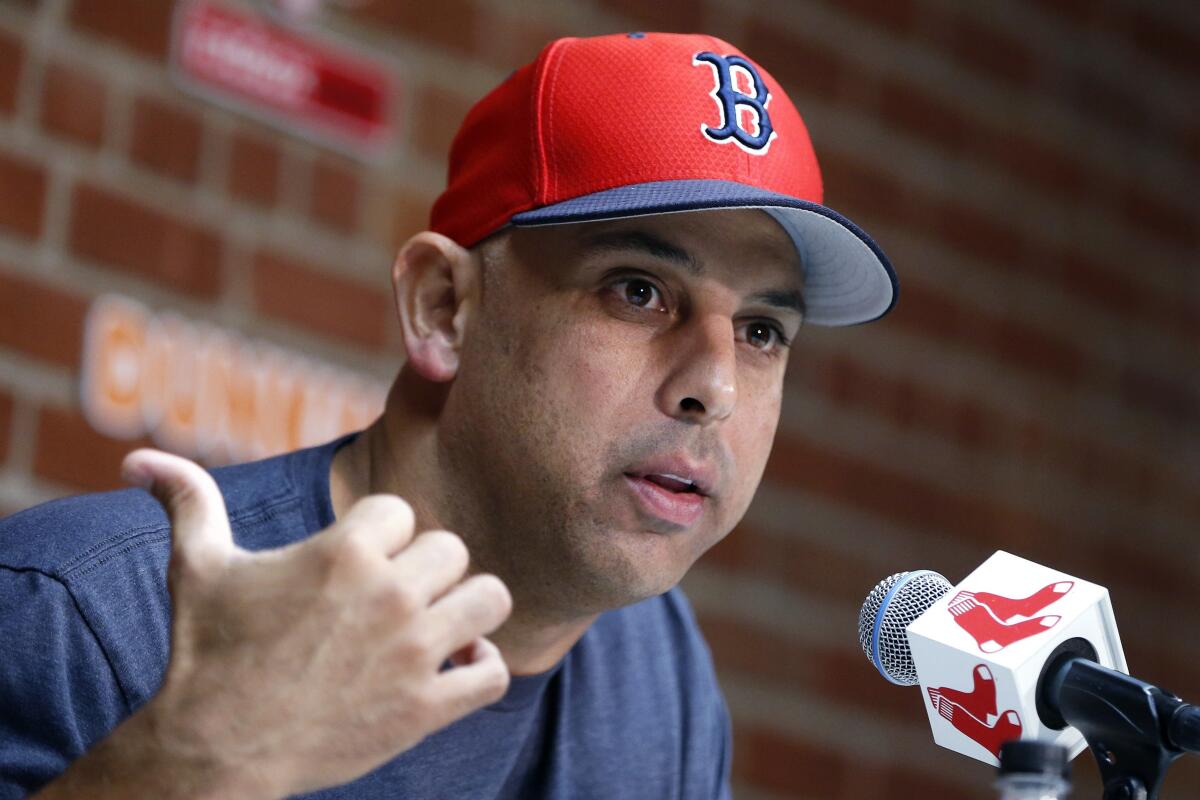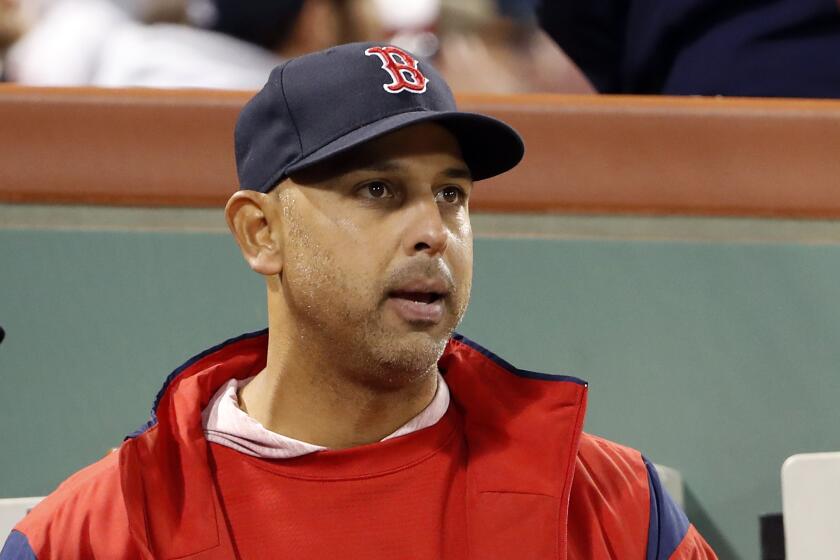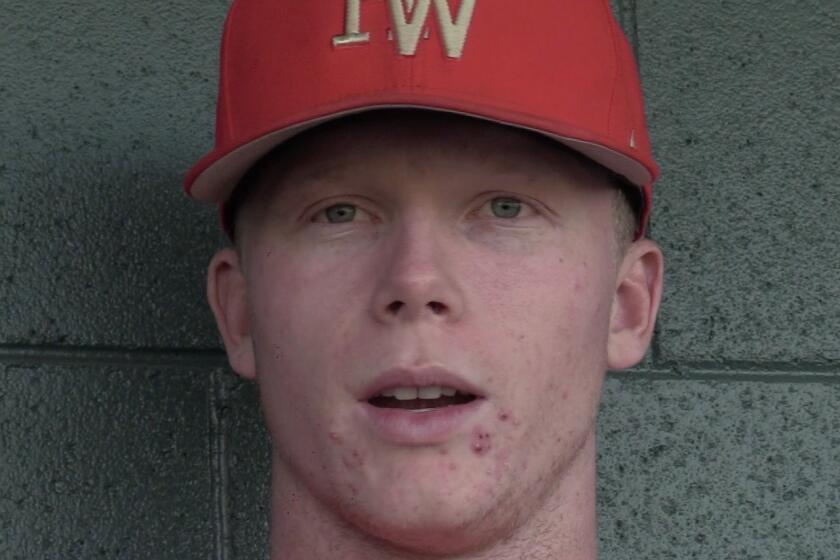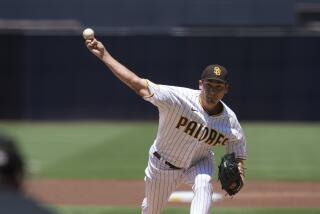Alex Cora is latest casualty in sign-stealing scandal, yet players are spared

- Share via
While questions remain concerning the 2017 Houston Astros’ rife illegal sign-stealing and Major League Baseball’s response, fallout from the biggest scandal in baseball since steroids inundated the sport continued Tuesday when the Boston Red Sox fired manager Alex Cora.
Cora, Houston’s bench coach in 2017, was charged in MLB’s nine-page report with working with players to devise the illegal sign-stealing system, which evolved into banging trash cans to relay catchers’ signs to hitters from a monitor placed behind the dugout.
The league levied punishment to the franchise, Astros general manager Jeff Luhnow, and Astros manager A.J. Hinch, but held off on disciplining Cora as it continues investigating allegations that the Red Sox also broke rules to steal signs en route to winning the World Series under Cora’s watch in 2018. The Red Sox, anticipating the penalty will be severe, did not wait to dismiss Cora, who first played in the major leagues with the Dodgers from 1998-2004.
“Given the findings and the commissioner’s ruling, we collectively decided that it would not be possible for Alex to effectively lead the club going forward and we mutually agreed to part ways,” the Red Sox said in a statement.
Twenty-four hours after MLB released its report on the Astros, current and former players, coaches and executives were still processing it all.
The Boston Red Sox fired manager Alex Cora on Tuesday, a day after MLB Commissioner Rob Manfred implicated him in the sport’s sign-stealing scandal.
Rich Hill, who pitched for the Dodgers the last four seasons, wondered about the impact the cheating may have had against his team, which lost to the 2017 Astros and 2018 Red Sox in the World Series. He thought about all the people behind the scenes — the clubhouse workers and bat boys and trainers and so on — that could have used the life-changing cash shares awarded to the championship club.
He considered the other teams the Astros outlasted en route to winning the title. His mind raced. He had questions.
“I don’t know how you justify it, really,” Hill said. “How do you justify something like that?”
Hill’s tenure in Los Angeles ended last month without winning a championship when he signed a one-year contract with the Minnesota Twins. The 2017 Dodgers club had the best shot, falling one win short of the franchise’s first title since 1988. MLB’s revelation Monday asserted that the Dodgers lost to a team that broke rules to improve its chances of winning “throughout the postseason” in 2017. There’s a chance it happened in 2018 too.
“Painful for the sport, painful for the fans, painful for the integrity of the game,” former Dodgers pitcher and current TV analyst Orel Hershiser said. “Yeah, it’s a sadness that we will get over with time, but it will definitely scar the Astros’ reputation. I mean, a reputation is something you earn and once you lose it, it’s hard to get back.”
To what degree the Astros cheated in the 2017 World Series remains unclear. MLB’s report did not disclose any details on the scope of the activity in the seven-game series. The team still used a monitor to relay signs in the postseason, but ditched the banging mechanism, according to a person with knowledge of the league’s investigation. Instead, they waited until a runner was on base to flash the signs to the batter.
“That’s where I want more details,” Hill said. “You can’t really give a solid, 100% comment if the details aren’t there. Because we’re now all speculating on what they did. Obviously, there was something that was going on because you have a general manager and a manager who were fired because of this. So, yes, something was going on. But for everyone to have the full picture and to be able to understand it, that needs to come out.”
The only Astros player cited as involved in the cheating was Carlos Beltrán. According to the report, the league’s investigation included interviews with 68 witnesses, including 23 former and current players. The report declared “most of the position players on the 2017 team” participated in the scheme. It described the activity as “player-driven” and “player-executed.” Players interviewed admitted they knew they were breaking rules.
And yet no players were punished. Beltrán, who retired after the 2017 season, was hired as manager of the New York Mets in November and remains in the position.
What lessons need to be learned by high school athletes after Astros’ scandal?
Commissioner Rob Manfred pointed to a September 2017 memo in which he cautioned clubs that he would severely discipline managers and general managers for using technology to steal signs. He stuck to his warning while also asserting that disciplining players was impractical given the number of players involved and their varying degrees of participation. Further, player punishment could have prompted an appeal or grievance from the players’ union.
“With players, you don’t know who did it, when they did it, why they did it, and you’re just gonna punish them?” former Angels center fielder Torii Hunter said. “This is how you get rid of it — you have to get rid of the people who allowed this to happen.”
Luhnow and Hinch were the only individuals disciplined. They were suspended for the 2020 season before Astros owner Jim Crane fired them. The franchise was fined $5 million and stripped of its first- and second-round picks in the next two drafts.
“I think it’s a strong punishment,” Hershiser said. “It could have been stronger, it could have been weaker, it’s just how baseball decided to handle it. It changes the course of history though, you know? You just never know what would have happened, not only in the World Series, but through the playoffs before that.”
On Tuesday, another person paid the price with his job, but frustrating what-ifs linger.
Times staff writer Mike DiGiovanna contributed to this report.
More to Read
Are you a true-blue fan?
Get our Dodgers Dugout newsletter for insights, news and much more.
You may occasionally receive promotional content from the Los Angeles Times.










